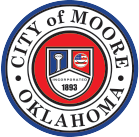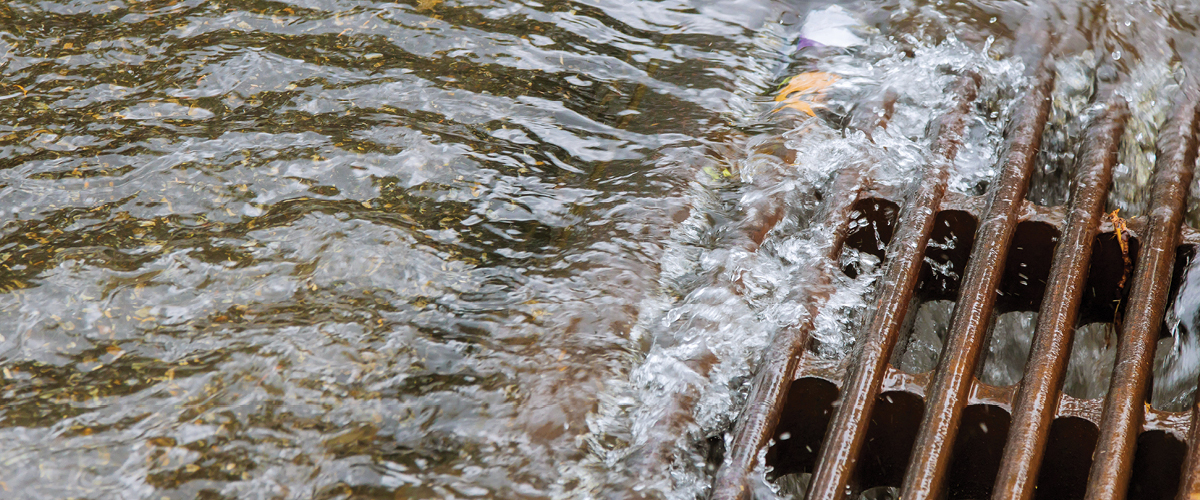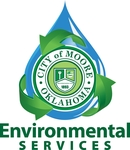Stormwater Management
When it rains, stormwater collects many types of hazardous materials that flow directly into area lakes and streams. Stormwater is only minimally treated and sometimes not treated at all before it reaches our waterways. Oils, chemicals, fertilizers, litter and waste in stormwater can cause major problems in waterways. The effects may vary; however, research has shown that pollution affects drinking water supplies, recreation, fisheries and wildlife. Stormwater pollution results from a wide variety of human activities. Each of us can contribute to the problem without even realizing it.
Stormwater Management Program
The City of Moore developed a Stormwater Management Program (SWMP) as required for coverage under the Oklahoma Pollutant Discharge Elimination System (OPDES), administered by the Oklahoma Department of Environmental Quality (ODEQ). The purpose of this program is to protect and enhance the water quality of streams, creeks, tributaries, lakes, springs, and wetlands.
The City of Moore’s OPDES MS4 permit authorizes direct discharge stormwater from the municipal separate storm sewer system (MS4) to ground waters and surface waters of the state. As part of complying with the OPDES MS4 Permit, the City has to develop and implement a Storm Water Management Program (SWMP). The SWMP focuses on five Minimum Control Measures to reduce the negative impacts of stormwater runoff and enhance water quality.
- Public Education and Involvement
- Industrial Stormwater Runoff
- Illicit Discharge Detection and Elimination
- Construction Site Stormwater Runoff
- Post-Construction Management in New Development and Redevelopment
- Pollution Prevention/Good Housekeeping
Reporting Stormwater Violations
To Report a Stormwater Violation, please call 405-793-5052 or click here.
Any new construction project that meets the following criteria must obtain a City of Moore Construction Stormwater Permit:
a. All new commercial, industrial, institutional, utility, or multi-family residential construction projects.
b. All new residential, commercial, or industrial subdivisions.
This permit allows you to discharge your stormwater runoff into the MS4. To successfully obtain your permit, the following materials must be submitted for review:
a. Copy of NOI to DEQ
b. A site plan that locates all MS4 inlets and outlets and sediment basins
c. A SWP3 prepared in the format provided by the City.
The Construction Stormwater Permit is required to be obtained before you start moving dirt. It is always advisable to meet with the Stormwater Compliance Inspector as soon as possible to discuss the project. But whatever you do, don’t start moving dirt until you get the permit. Failure to get a permit prior to commencing the project may result in daily fines and/or costly delays.
When you are ready to file the final plat, the Stormwater Compliance Inspector will inspect your project for the required erosion control measures. After all measures are complete, your plat will be released to be filed at Cleveland County. However, as the developer, you will always retain responsibility for the public infrastructure, with few exceptions. For builders, all permanent erosion control measures must be in place prior to getting a permanent CO.
Builders and Developers, don’t take this permit lightly! When you sign it, you are certifying that you understand what is required of you with the submitted SWP3. If your engineer prepares your SWP3 and Erosion Control Plans, it is imperative that you read and understand it. You can be held legally liable for the actions described in the permit. Some actions that you can be held liable for include:
a. Bi-Weekly or weekly inspections of the erosion control measures
b. Repairing and/or maintaining erosion control measures
c. Keeping records of inspections and maintenance
New construction projects must submit additional information as to how they will control sedimentation and pollutants from their site. This can be accomplished in two ways:
Option 1: Construction Stormwater Permit Transfer. This option is only available to those building within a platted subdivision. Although the easiest option, it may not be available for all builders. To choose this option, the builder and the developer must each execute the permit transfer document. This document certifies that the builder will continue to perform and maintain the inspections and Best Management Practices (BMPs) for their lot(s).
Option 2: Construction Storwmater Discharge Permit. This option will generally apply to those projects that are not within a platted subdivision. The builder will be required to submit a Construction Stormwater Discharge Permit Application, along with all supporting materials, such as an erosion control plan, and the Stormwater Pollution Prevention Plan (SWP3). The detail of the SWP3 will correspond with the complexity of the project.
In all cases, the forms provided for the City’s SWP3 must be filled out and turned in with the application. In addition to the new paperwork requirements, additional drainage inspections have been set up for new construction projects. It should be noted that the builder holds the responsibility to ensure that the developer’s approved drainage plan is protected throughout the project, and that the project does not impact that overall drainage plan. However, the City will do 2 separate stormwater inspections to identify any major lot-specific drainage and/or erosion control issues:
Rough-in Stormwater Inspection. This inspection will be performed during the rough-in stage, after all sub-contractors have called in. The stormwater compliance inspector will be looking for drainage swales and lot grading, as well as erosion control BMPs.
Final Stormwater Inspection. This inspection will be performed during the final stage, after all sub-contractors have called in. The stormwater compliance inspector will be looking for appropriate sodding, debris in the drainage system, etc.
The Moore City Code calls adding a prohibited substance to the stormwater system an “illicit discharge.” List of common illicit discharges:
- Swimming Pool Water or Chemicals
- Laundry washwater or dishwater
- Garbage, Oil, Paint or rubbish
- Wrecked or discarded vehicles, appliances or equipment
- Yard Waste
- Household Hazardous Waste and Chemical
Dumping any of these items to any street, drainage channel, drainage flume, pond, or creek is illegal. Even if a household product claims to be “environmentally friendly” or “biodegradeable," it is still not safe or legal to drain to the city’s stormwater system!
If you see an illicit discharge take place, please call 405-793-5052 to report the violation or click here.
To encourage proper disposal of hazardous household waste, the City of Moore has contracted with Oklahoma City to use their state-of-the art facility.
- Under 7.5 gallons: 1 free monthly pass per household; more than once per month: $39.50
- Between 7.5 – 15 gallons: $79
- Between 15 – 22.5 gallons: $118.50
- Over 22.5 gallons: $158.00
1621 S Portland Ave, Oklahoma City, OK 73108
Tuesday-Friday 9:30 am–6 pm, Saturday 8:30 am–11:30 am
Phone: 405-682-7038
https://www.okc.gov


